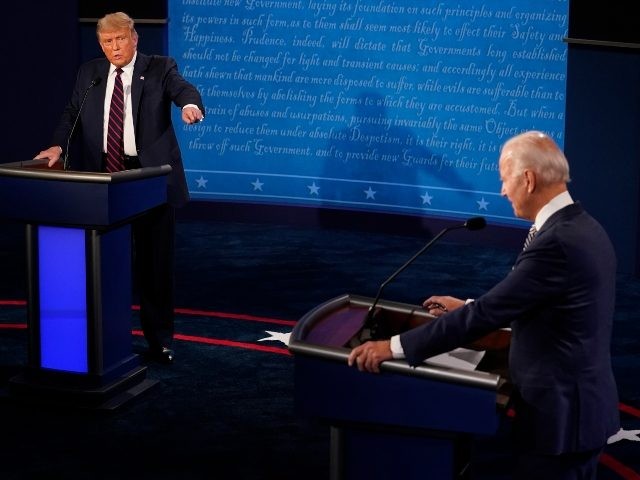The immigration issue that delivered the presidency to Donald Trump in 2016 will be ignored again in the next presidential debate, according to a statement released Friday by the Commission on Presidential Debates.
The debate topics selected by the bipartisan establishment figures on the commission are listed as “Fighting COVID-19,” “American Families,” “Race in America,” “Climate Change,” “National Security,” and “Leadership.”
The 90-minute debate will be held in Nashville, TN, and will be moderated by Kristen Welker, an NBC News White House correspondent. The commission said the NBC employee selected the debate topics.
The picked moderators ignored immigration — and the linked issues of jobs, wages, innovation, income disparity, and national security — in the first presidential debate, the vice presidential debate, and one of two town halls.
In Trump’s October 15 town hall, he was asked about the fate of 700,000 Deferred Action for Childhood Arrivals (DACA) illegal aliens who got work permits from President Barack Obama in 2012. But Trump was not asked about immigration’s impact on Americans’ jobs, wages, housing, and society.
Yet immigration is a central factor in all of the non-immigration issues selected for the upcoming debate, said Kevin Lynn, founder of U.S. Tech Workers. He recently helped U.S. workers in Tennesee defeat a corporate effort to outsource their jobs to the H-1B visa workers.
“If you don’t know who is in your country and if you don’t have a culture where everyone is on the same sheet of music … How are you going to trace [contagious people] effectively with a population of illegals?” said Lynn.
He continued:
We know that we built the middle class at a time when we restricted immigration. We restricted it so that immigration policy worked well for Americans, and it worked well for the newcomers. What was going on before we began to restrict immigration in the 1920s? Well, the chambers of commerce would flood the labor market with willing and eager immigrants, only too happy to work for less.
In America, when immigrants have arrived, regardless of race, they’ve moved up the economic and social ladder. One group has lagged, and that’s the American Descendants of Slaves (ADOS). The times when ADOS has done better in this country, when they’ve actually made significant advances up the economic and social ladder, were during restricted immigration from the mid-1920s to the mid-1960s. If we want to have a society that is equitable, the most practical solution to create a tight labor market, to make sure that people are not being displaced in the labor force.
Eighty-eight percent of our population growth is directly attributable to immigrants and the children of immigrants. As we increase population, we increase the demand for things like housing and infrastructure, and we increase individual carbon footprints. We’re injecting [immigrant] people into a middle-class lifestyle in which just about everything is centered around the automobile. We have in America the second greatest individual carbon footprint of any country — short of the United Arab Emirates — so when you increase the population, you’re increasing our carbon footprint.
When you look at U.S. graduates across the United States, they’re being displaced from tech jobs in our financial sector, our insurance sector, our healthcare industry. We have a huge contingent of foreign workers on employment visas working in our federal, state, and local governments. In many of our utilities, like Southern California Edison and Northeast Utilities, they’ve outsourced their technology and other support branches. If they’re not being worked here in the country by foreigners working for H-1B company, they’re being offshored to other countries. And if we think we had an issue when COVID struck in producing personal protective equipment because we had offshored all those manufacturing jobs, then imagine what’s going to happen when we no longer control financial, insurance, healthcare data at the federal level … Talk about national security problems!
A real leader looks at the facts and makes the hard decisions. The easy decision is to say that anyone who wants to come to America can come. But 100 years ago, we realized that that did not work well for Americans, and leaders like [Presidents] FDR, Truman, and Eisenhow understood we had to restrict immigration for the benefit of both American and arrivals. We understood the impact that increasing numbers of immigrants have on the economic security of Americans, the national security of Americans, and the environmental impact. A real leader would restrict immigration because that is the best interest of Americans’ society.
Open-ended legal migration is praised by business and progressives partly because the arrival of migrants helps to transfer wealth from wage-earners to stockholders.
Migration moves money from employees to employers, from families to investors, from young to old, from homebuyers to real estate investors, and from the central states to the coastal states.
Migration also allows investors and CEOs to skimp on labor-saving technology, sideline U.S. minorities, ignore disabled people, exploit stoop labor in the fields, short-change labor in the cities, impose tight controls on American professionals, centralize technological innovation, and undermine labor rights.

COMMENTS
Please let us know if you're having issues with commenting.